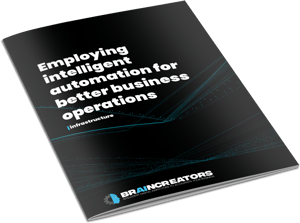Repetitive work is clearly not the best use of human intelligence. We excel at creativity, emotional involvement, and contextual reasoning. So why are we still performing those repetitive tasks? The answer is that they require domain knowledge, experience, and skill.
Our new ebook "Employing intelligent automation for better business operations" explores how companies are already deriving value from intelligent automation.
Traditional automation
It’s hard to find an industry where automation doesn’t play a major role - many processes are optimized by software, robots, and SaaS. Human resources are still performing repetitive tasks in most organizations that inspect assets such as roads, equipment, or materials manually, even though the results and work orders are driven by IT systems.
Computer programming has a hard time dealing with these tasks, as every piece of knowledge has to be explicitly coded as a formal rule. There are simply too many variables and exceptions to write everything in code, especially if changes in the process or circumstances are anticipated.
Intelligent automation
Enter intelligent automation. Intelligence is the capability to acquire and apply knowledge and skill. In other words, the ability to learn. Thanks to recent developments in artificial intelligence (AI), machines are able to learn a specific skill without being explicitly programmed and execute the associated task(s) consistently.
Moreover, the machines will keep learning over time while receiving occasional feedback from human experts. As a result, humans have more time to spend on tasks that require a creative solution.
Creating value
This is all well and good, but how does it translate to your world? The obvious first question is where to start. Out of all the processes that could be improved and tasks that could be automated, which create the most value in the short and long term?
A useful exercise to find the most suitable cases is to look for sources of friction between cost, time, and customer satisfaction. If it takes a long time to deliver a product or service; customer returns as a result of quality issues are a problem; or a process requires a lot of fine-tuning to reach consensus, you’ve most likely found a suitable candidate for intelligent automation.
Are you interested to have more in-depth information about how intelligent automation can improve your processes? Download our free ebook now!

